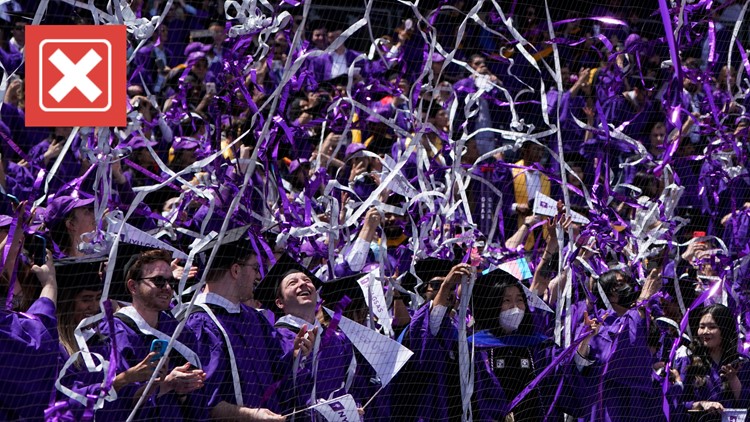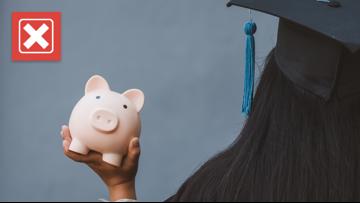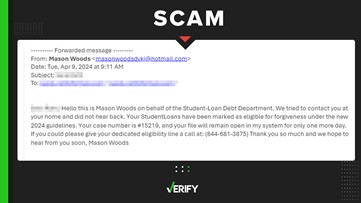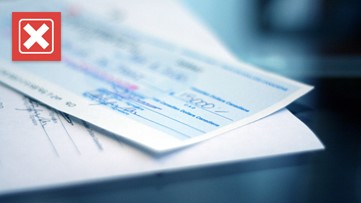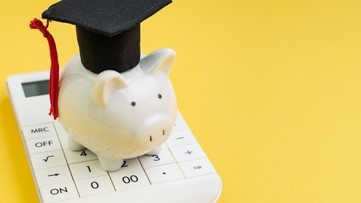UPDATE (6/30/23): The Supreme Court has struck down the Biden administration's one-time student loan forgiveness plan. Loan repayments are expected to resume later this summer. You can read more information here.
When President Biden announced his administration’s plan for widespread student loan forgiveness, many student borrowers talked about the interest on their loans.
Student borrowers frequently recounted stories about paying many times more than they initially borrowed, some admitting they still owe student loan payments even after paying well past their principal.
That left many wondering why cutting interest or eliminating interest rates, both going forward or retroactively, wasn’t a part of the Biden administration’s plan.
Some people pointed to the 0% interest rates as part of the ongoing student loan pause as evidence Biden can eliminate student loan interest rates.
More from VERIFY: Yes, graduate loans are eligible for loan forgiveness
THE QUESTION
Can the president permanently change federal student loan interest rates?
THE SOURCES
- U.S. Department of Education
- LendEDU, an information site for comparing and learning about student loans
- Federal laws including CARES Act, Higher Education Act of 1965 and Bipartisan Student Loan Certainty Act
- The White House
- Betsy Mayotte, founder and president of The Institute of Student Loan Advisors (TISLA)
- Jessica Thompson, the vice president of The Institute for College Access & Success (TICAS)
THE ANSWER
No, the president cannot permanently change federal student loan interest rates.
WHAT WE FOUND
The president is not authorized to make permanent changes to federal student loan interest rates. That power belongs to Congress, which uses formulas to automatically update the rates each year.
“The reason that President Biden didn't permanently reduce interest rates as part of this is because he doesn't have the authority to do so,” said Betsy Mayotte, founder and president of The Institute of Student Loan Advisors (TISLA). “Congress is the one which sets interest rates, they do it within federal law, and Congress is the one that would have to permanently make a change, or permanently reduce interest rates.”
The U.S. Department of Education explains that all interest rates for federal student loans given to student borrowers since 2006 have fixed interest rates, meaning the interest rate will not change over the lifetime of the loan. Loans taken by students before 2006 have variable interest rates that change year-to-year.
If an undergraduate student were to take a federal student loan right now, their loan — once the payment pause ends — will have an interest rate of 4.99%. There are different interest rates for graduate students and for parents depending on the type of loan they receive.
New rates are set each year, but the Education Department says they aren’t set by them. They’re set by federal law, the department says. Federal law is written and passed by Congress.
According to LendEDU, an information site about student loans, each year’s new interest rates are in effect from July 1 through June 30 of the next year. Congress signed the Bipartisan Student Loan Certainty Act into law in August 2013 to set the current formula for automatically updating federal student loan interest rates. Each formula adds a fixed percent to the rates of the 10-year Treasury Note.
The Department of Education explains that the law also sets a cap on these interest rates, so they can never go above a certain percent. That cap is 8.25% for undergraduate students, and can be as high as 10.50% for PLUS loans taken by parents and graduate students.
More from VERIFY: Yes, Parent PLUS loans are eligible for debt forgiveness
So why has interest been at 0% for the last couple of years? That’s because of a provision in the 2020 CARES Act, a law that originated in and was passed by Congress.
Section 4513 of the law says the Secretary of Education will suspend all payments due for student loans held by the Department of Education for three months, and that interest will not accrue for these loans the entire time they’re suspended. It also says the Secretary of Education may extend this suspension for three months at a time.
The Department of Education is part of the executive branch, which means the Secretary of Education answers to the president. So the president — Trump in 2020, Biden now — can direct the Education Secretary to use the authority given to them by Congress and keep interest rates at 0% by extending the payment pause.
But once the payment pause ends, which the Biden administration says will be on December 31, 2022, federal student loan interest rates will return to those determined by the formula set by Congress.
More from VERIFY: Yes, you can get a refund if you paid federal student loans during the payment pause
Other efforts to reduce student loan interest by President Biden have been accomplished similarly: by working within the framework of laws passed by Congress.
Earlier this year, Biden’s Department of Education proposed a rule that would remove instances of interest capitalization wherever it is not required by statute — namely the Higher Education Act of 1965, which is frequently amended to set the rules for federal student loans.
Interest capitalization is when unpaid interest is added to the principal amount of a student loan. Since interest is calculated as a percent of the principal, this makes interest payments higher and is one of the reasons borrowers end up owing more after years of payments. The Higher Education Act of 1965 requires it in certain situations, so Biden can’t eliminate it entirely.
Similarly, the Biden administration is attempting to take advantage of a provision in the Higher Education Act that gives the Secretary of Education authority to create income-driven repayment plans to reduce interest accrual for borrowers on those plans.
A new rule, announced as part of the administration’s student loan forgiveness plan, would make it so borrowers on income-driven repayment plans won’t see their balances grow as long as they make their monthly payments. This means a borrower won’t see their interest accrue even if their monthly payments aren’t enough to cover their monthly interest.
Jessica Thompson, the vice president of The Institute for College Access & Success (TICAS), said that the Department of Education will create a subsidy for these borrowers. This means the Department of Education will pay for the interest that still accrues for people on these plans.
“[It’s] a really important way to restrain that balance growth for particularly low and middle income borrowers whose incomes mean that their payments and IDR don't cover that interest,” Thompson said. “So again, those are not changes to the underlying interest.”
Any changes the Biden administration would make to the underlying interest would have to be with the support of a law passed by Congress.

